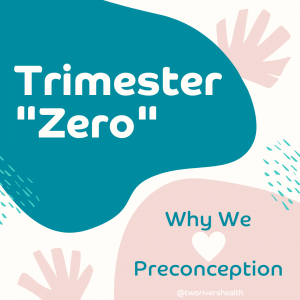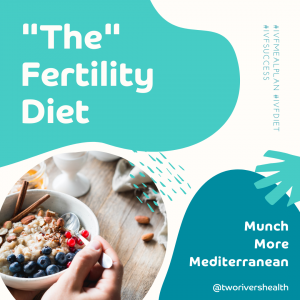There’s a lot riding on an IVF cycle.
Although IVF is the most advanced modern medical approach to infertility – and a godsend for thousands of now-parents – on average (assuming no other interventions such as the ones we’re about to discuss here) each couple has just about a 30% chance of bringing home a baby, after 4 IVF cycles.
With each cycle costing an average of $15,000 – not to mention the physical and emotional toll of going through fertility treatments – we definitely want to make it count.
Egg quality issues are among the top reasons for IVF failure. In this blog, we’re going to explore 5 ways to enhance follicle and egg quality in advance of IVF retrieval. (Even if you’re not planning for IVF, these suggestions still apply for natural conception).
That’s why I feel it’s so important to get the word out there that there are specific actions woman can take to enhance their chances of successful IVF pregnancy.
The key is in planning ahead.
Trimester Zero: Why We’re All About Preconception
Although we’re born with our full lifetime complement of eggs (“oocytes”), they hang out in our ovaries in a mid-stage of development until hormones of puberty start triggering a small group of them to complete their maturation. Like classes entering school on continuous monthly enrollment, small group by small group they step into their program and about three months later, they graduate: Either to being the most successful, valedictorian egg that wins the honour of being ovulated and presented for possible fertilization, or to be one of the rest of the class, none of which make it to the next phase.
In an IVF cycle, medications are used to cultivate multiple valedictorians to develop from each class. This is intended to increase the number of fertilized eggs, so that there will be more viable embryos available to transfer.
Whether you’re planning for natural conception, IUI or IVF, during the three months or so before IVF egg retrieval or ovulation, the body makes a significant investment in completing follicle development and egg growth and maturation. Here’s our window of opportunity to make an investment in our fertility success, because the healthier the eggs, the healthier the embryo can be and the more likely to have a successful pregnancy – and a healthy, happy baby!
Enriching Egg Quality = Enhancing IVF Success
Here are my most-current, top five suggestions to enrich egg quality in order to increase chances for a successful IVF pregnancy.
-
Eat For Egg Health
During “trimester zero” aka the few months preconception, enjoy foods that naturally support healthy egg development. This means enjoying plenty of fresh vegetables for their folate and antioxidants, include protein with meals and snacks to help build healthy tissues and keep your blood sugar and insulin in check, and have iron-rich foods to support the increased requirements for both follicle maturation, and soon, pregnancy! It’s helpful in this pre-IVF season to have your nutrition, and your nutrient levels, assessed so that you can be increasing your intake of any nutrients you’re running low on. Folate, vitamin B12, iron and vitamin D are some of the most important ones to have checked.
-
Be a Quitter
If you haven’t already, now is the time to Q U I T smoking. While you’re at it, set the vaping, marijuana and alcohol aside because all of these social toxins introduce harmful chemicals into the body and perpetuate oxidative stress that can ultimately show up in lower quality eggs. There are many avenues for support to help with quitting. Check with your family doctor or naturopathic doctor for options to make your efforts to quit successful and permanent.
-
Be In It Together
…and by “it”, I mean “It”! The science of sex and intimacy tells us that the more connected and in love you and your partner feel with each other, the healthier your hormones get! One of the biggest sources of stress of infertility is the level of pressure on a relationship. Leading up to IVF, you don’t need to avoid having sex until the specific dates your specialist advises. Instead, take the pressure off, plan some date nights that involve having fun and being 100% present with each other. It’s the perfect time to let sex be fun and pleasurable again.
-
Spark of Life
IVF photography taken at the microscopic level has captured a spark of light that flashes at the moment the sperm fertilizes the egg. The spark of life! Just like the ovation-worthy performance of your favourite artist, let’s rewind a few months back from that miraculous moment and consider how many big and small things that need to happen first to enable the moment of conception to happen. Since energy can neither be created nor destroyed, we want to choicefully input the best possible energy into our systems in the months leading up to IVF. In The Biology of Belief, scientist Bruce Lipton describes how our thoughts and beliefs affect our physiology – in ways that are measurable at the cellular level. This may mean getting help with the energy of our thoughts, emotions, and beliefs so that we’re programming our systems to receive a healthy pregnancy. In the months leading up to IVF, we get to be choiceful about what kinds of energy inputs we put into our systems so that we expect the greatest possible outcomes. Therapies you can add into your IVF preparation plan that have been shown to enhance the chances of success include meditation, group-based mindfulness and stress reduction, and acupuncture – a therapy that induces relaxation, helps to balance hormones, and promotes blood flow to the reproductive system. A 2019 Medical Acupuncture study showed that acupuncture significantly increased the success and safety of the egg stimulation phase of IVF.
Physical activities that increase blood flow to the reproductive system will increase delivery of nutrients and energy to your ovaries and eggs. Make sure your pelvis and hips are well aligned by working with an osteopath, chiropractor or pelvic physiotherapist. Move your body every day through yoga, dance, a fitness class you enjoy, or an outdoor walk, hike or bike ride. For even more ideas on how to increase pelvic blood flow…See #3 (above).
-
Munch More Mediterranean
In 2010, a study in Fertility and Sterility reported that eating a Mediterranean-style diet could increase the chances of IVF pregnancy by up to 40%. It’s important to note, both partners were eating Mediterranean-style in this study. Two additional studies have recently shown that the Mediterranean diet can increase the average number of embryos obtained in IVF, in this case from even to eight (which is statistically and clinically significant as only one embryo is usually transferred at a time), and gave women a 2.7 times greater chance of conceiving and having a baby through IVF.
The good news is, it’s easy and delicious to munch Mediterranean. There are many resources online with recipe ideas, and my upcoming book, IVF Meal Plan, focuses on a Mediterranean-style nutrition pattern for optimal fertility and IVF success.
If you’re facing fertility challenges, planning for IVF this year, you’re not alone. Through our Well Conceived Fertility program, we’ve helped many women and couples to nourish themselves and get back to feeling their best through their journey into motherhood. We’d love to help you with this, too. We work with clients based in Guelph and beyond through telemedicine and our online resources. Feel free to book in a complimentary Conception Confidence Call to see if our approach to integrative fertility care is a good fit for you. Please note that times shown are in Eastern Time (Toronto/New York).
References:
Hum Reprod. 2018 Mar 1;33(3):494-502. doi: 10.1093/humrep/dey003.
Adherence to the Mediterranean diet and IVF success rate among non-obese women attempting fertility.
Karayiannis D1, Kontogianni MD1, Mendorou C2, Mastrominas M2, Yiannakouris N1. https://www.ncbi.nlm.nih.gov/pubmed/29390148
Reprod Biol Endocrinol. 2019 Sep 2;17(1):73. doi: 10.1186/s12958-019-0520-9.
Mediterranean diet improves embryo yield in IVF: a prospective cohort study.
Sun H1, Lin Y1, Lin D1, Zou C1, Zou X1, Fu L1, Meng F1, Qian W2. https://www.ncbi.nlm.nih.gov/pubmed/31477128
Fertil Steril. 2010 Nov;94(6):2096-101. doi: 10.1016/j.fertnstert.2009.12.079. Epub 2010 Mar 1.





